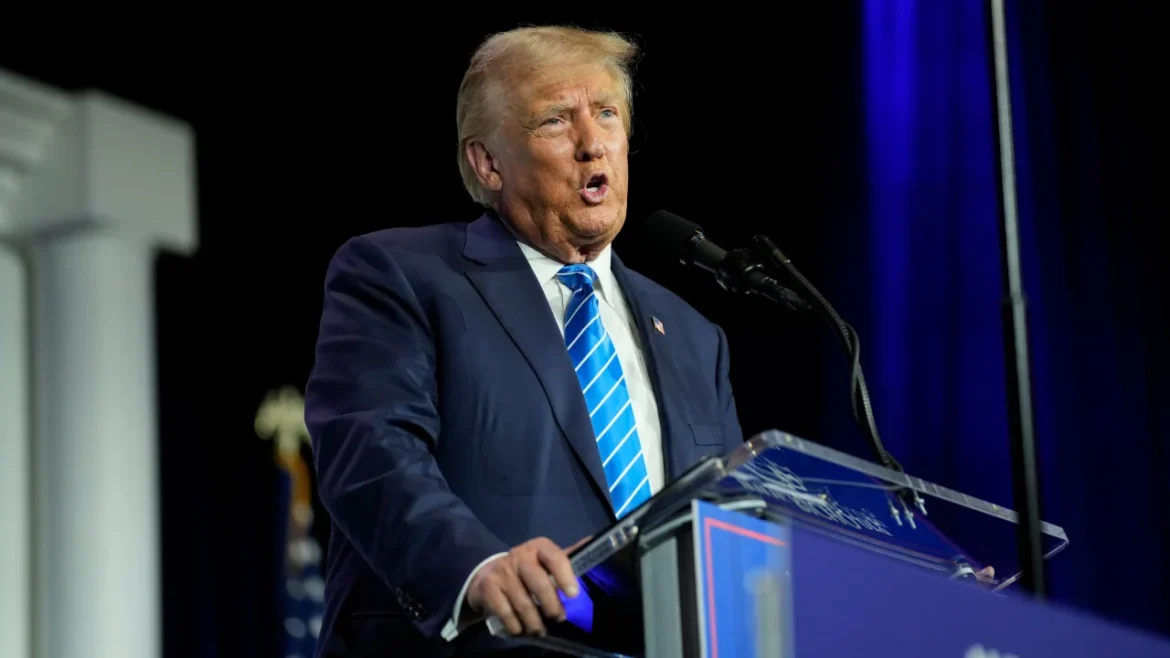Former President Donald Trump has unveiled his vision for a significant transformation in higher education, vowing to create a federally funded online university that would grant degrees free of charge while adhering to a strict policy against “wokeness or jihadism.”
In a new campaign policy video, Trump outlined his plan to introduce a novel educational institution called the “American Academy.” The proposed funding source for this venture is a tax imposed on large private university endowments. The American Academy would also allow students to receive academic credits for prior coursework and leverage these credentials when applying for positions with the U.S. government and federal contractors.
The announcement comes at a time when U.S. educational institutions, including prestigious universities, have been under heightened political scrutiny. Recent events, such as responses to the conflict involving Israel and Hamas, have generated criticism from prominent business leaders, politicians, and donors. Some have even pledged to withhold future contributions to these institutions due to perceived equivocal responses or the presence of pro-Palestinian speakers on campuses.
Donald Trump, in a video accompanying his proposal, criticized the current state of higher education, saying, “We spend more money on higher education than any other country and yet, they’re turning our students into communists and terrorists and sympathizers of many, many different dimensions. We can’t let this happen.”
The Trump campaign has not yet determined who would oversee the American Academy but has suggested that a combination of private sector resources and various potential models, such as supervision by a government agency, a presidentially appointed board or commission, or a publicly funded private entity, would be explored.
Establishing an entirely new educational institution through the federal government to compete with the existing array of schools would represent a significant overhaul of the landscape of American higher education. Such a proposal would require approval from Congress.
In his plan, Trump advocates for supporting the new educational institution by taxing the substantial endowments of private universities, a move that has long been favored by conservatives. Notably, Trump’s 2017 tax law introduced a 1.4 percent tax on investment income for the nation’s wealthiest private universities. In 2022, 58 institutions collectively paid $244 million in taxes under this law, as per the most recent IRS data. It remains uncertain whether this revenue alone would suffice to fund the proposed educational institution. Trump has also suggested generating funds by imposing fines and legal action against wealthy universities.
This initiative constitutes an endeavor by the former president to make a significant policy impact in a field where the current president, Joe Biden, has sought to enact changes. The Biden administration has been exploring various strategies for relieving student debt, including assistance for individuals who possess college debt but did not complete their degree. This demographic typically holds smaller debt burdens compared to college graduates but faces challenges in repayment.
Trump’s proposal targets more than 40 million Americans who have some college education but never obtained their degree. It encompasses various types of credentials, including degrees, that would be recognized by the federal government and its contractors. In the video, Trump emphasized that the American Academy would grant credit for past coursework and offer students the opportunity to complete their education without tuition fees.
The approach put forward by Trump is distinct from Joe Biden’s plan for free college, which primarily revolves around relieving hundreds of billions of dollars in student loan debt. According to a campaign official, this proposal seeks to provide affordable higher education options without incurring trillions of dollars in costs.
Notably, this is not the first time the Trump campaign has ventured into education policy discussions. Previously, Trump called for revised accreditation standards for colleges and universities, advocated the removal of diversity, equity, and inclusion administrators, and emphasized the defense of “American and Western civilization” in school curricula. He also recommended the implementation of entrance and exit exams for college and university students, ensuring they receive value for their educational investment. Furthermore, he promoted the provision of accelerated and cost-effective degree options and emphasized career placement services.
Trump had previously sought to establish Trump University, an endeavor that ultimately led to a $25 million settlement to resolve allegations of fraud in the real estate seminar program.
The concept of establishing a national American university has historical roots, with George Washington proposing the idea in his first address to Congress in 1780. Recently, some Republicans have advocated for reforming the traditional U.S. higher education system, citing campuses that they view as bastions of progressivism hostile to conservative perspectives.
Florida Governor Ron DeSantis, Trump’s rival for the GOP nomination, has echoed similar calls to revamp college accreditation and higher education. In Florida, DeSantis has initiated measures to restrict state colleges from funding diversity programs and transform a public liberal arts school into a more conservative-leaning institution, although this transformation has encountered challenges.
During his time in office, Trump’s Education Department sought to deregulate higher education, particularly online and for-profit colleges, aiming to eliminate federal regulations that many Republicans believed hindered innovation among educational institutions. Democrats opposed these changes, arguing that reduced federal oversight could lead to institutions misleading or coercing students into incurring debt for programs of questionable value. Biden’s Education Department has taken steps to reinstate many of the federal rules revoked by Trump, often implementing even more stringent regulations on colleges and universities.




